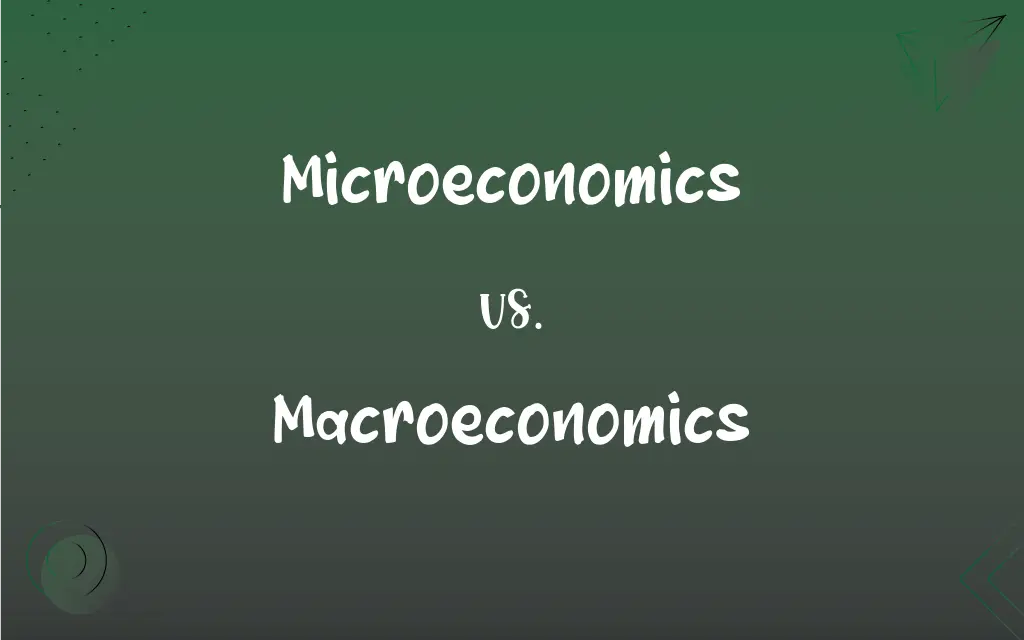Microeconomics vs. Macroeconomics: What's the Difference?
Edited by Aimie Carlson || By Harlon Moss || Updated on October 18, 2023
Microeconomics studies individual economic units and behavior, while macroeconomics analyzes entire economies and their aggregate phenomena.

Key Differences
Microeconomics delves into the choices and behaviors of individual economic units, such as consumers and firms. In contrast, macroeconomics focuses on the performance, structure, and behavior of an entire economy.
Microeconomics is concerned with issues like consumer demand, producer supply, and price determination for specific goods and services. On the other hand, macroeconomics deals with broader issues like national income, employment levels, and inflation rates.
The theories and tools of microeconomics are used to evaluate specific markets or sectors, making it integral for business decisions and policy evaluations. Conversely, macroeconomics provides the framework for national fiscal and monetary policies, influencing broad economic outcomes.
Microeconomics might address how a specific company can maximize its production and capacity, focusing on minimizing costs and enhancing profit. In comparison, macroeconomics might study how government policies can affect unemployment rates or boost overall economic growth.
Understanding microeconomics is essential for comprehending how individual decisions interact in specific markets. Meanwhile, a grasp of macroeconomics is crucial for understanding the overarching trends and forces that shape the broader economic landscape.
ADVERTISEMENT
Comparison Chart
Focus
Individual economic units like consumers and firms.
Entire economies, considering aggregate factors.
Concerns
Consumer demand, producer supply, price of specific goods.
National income, employment levels, inflation.
Application
Business decisions, specific market evaluations.
National fiscal and monetary policies.
Example Topics
Pricing strategies, production costs, market competition.
GDP growth, unemployment rate, monetary policy effects.
Scope
Specific markets or sectors.
Broader economic trends affecting entire countries or the global economy.
ADVERTISEMENT
Microeconomics and Macroeconomics Definitions
Microeconomics
The study of individual economic choices and behaviors.
Microeconomics examines how consumers react to changes in product prices.
Macroeconomics
The study of broad economic factors and trends on a national or global scale.
Macroeconomics analyzes the impact of fiscal policies on national unemployment rates.
Microeconomics
The analysis of supply and demand in specific markets.
Microeconomics can predict how a new tax might impact cigarette sales.
Macroeconomics
The analysis of how entire economies achieve and maintain growth and stability.
Macroeconomics emphasizes the importance of national savings rates for sustained economic development.
Microeconomics
The exploration of production, distribution, and consumption on a small scale.
Microeconomics helped the local bakery determine the optimal price for its pastries.
Macroeconomics
The exploration of aggregate economic phenomena like inflation and GDP.
Through macroeconomics, economists can track a country's overall economic health.
Microeconomics
The science of understanding how individual firms maximize profit.
Using microeconomics, the tech company identified areas for cost-saving.
Macroeconomics
The branch of economics examining the structure and performance of entire economies.
Macroeconomics offers insights into the causes and effects of economic recessions.
Microeconomics
The branch of economics concerned with decision-making under scarcity.
Microeconomics teaches us how consumers make choices when resources are limited.
Macroeconomics
The science of understanding fiscal and monetary policies and their effects.
Macroeconomics provides governments with tools to steer economies toward growth.
Microeconomics
The study of how businesses, households, and individuals within an economy allocate limited resources.
Macroeconomics
The study of the overall aspects and workings of a national economy, such as income, output, and the interrelationship among diverse economic sectors.
Microeconomics
The field of economics that deals with small-scale economic activities such as those of an individual or company.
Macroeconomics
The study of the entire economy in terms of the total amount of goods and services produced, total income earned, the level of employment of productive resources, and the general behavior of prices.
Microeconomics
The branch of economics that studies the economy of consumers or households or individual firms
Macroeconomics
The branch of economics that studies the overall working of a national economy
FAQs
Can microeconomics help businesses make decisions?
Yes, microeconomics offers insights into market behaviors, helping businesses strategize effectively.
What's the primary focus of microeconomics?
Microeconomics focuses on individual economic choices and behaviors.
What might microeconomics analyze regarding a product?
Microeconomics might study demand, pricing, and consumer behaviors related to that product.
Does macroeconomics deal with global economic trends?
Yes, macroeconomics can analyze broad economic phenomena affecting the global economy.
Does macroeconomics concern itself with individual firm performance?
No, macroeconomics focuses on broader economic trends rather than individual firms.
How does macroeconomics view the global economy?
Macroeconomics can study economic interactions, trends, and policies on a global scale.
How does macroeconomics differ from microeconomics in scope?
Macroeconomics looks at entire economies, while microeconomics examines specific markets or sectors.
What role does macroeconomics play in understanding recessions?
Macroeconomics studies the causes, effects, and policy responses to economic downturns.
Can macroeconomics provide insights into inflation?
Yes, macroeconomics studies the factors leading to and consequences of inflation.
Can microeconomics offer insights into income distribution within a specific sector?
Yes, microeconomics can study income, wealth distribution, and factors affecting them in specific markets.
Does macroeconomics study the impact of interest rates?
Yes, macroeconomics examines how interest rates affect overall economic activity and stability.
Is macroeconomics essential for government policy-making?
Yes, macroeconomics provides the framework for national fiscal and monetary policies.
How does macroeconomics view unemployment?
Macroeconomics examines unemployment from a national perspective, analyzing overall rates and trends.
How do pricing strategies relate to microeconomics?
Microeconomics examines how prices are determined in markets and how firms can optimize pricing.
Is consumer demand a microeconomic or macroeconomic concern?
Consumer demand is primarily a microeconomic concern.
Can microeconomics offer insights into market competition?
Yes, microeconomics delves into market structures, competition, and firm behaviors.
Can microeconomics help in understanding resource allocation?
Yes, microeconomics deals with decision-making under resource scarcity.
Is GDP a microeconomic or macroeconomic measure?
GDP is a macroeconomic measure, reflecting the total production of an economy.
Does microeconomics study the behavior of individual consumers?
Yes, microeconomics delves into consumer preferences, choices, and reactions to price changes.
Does microeconomics consider market failures?
Yes, microeconomics examines market inefficiencies and potential interventions.
About Author
Written by
Harlon MossHarlon is a seasoned quality moderator and accomplished content writer for Difference Wiki. An alumnus of the prestigious University of California, he earned his degree in Computer Science. Leveraging his academic background, Harlon brings a meticulous and informed perspective to his work, ensuring content accuracy and excellence.
Edited by
Aimie CarlsonAimie Carlson, holding a master's degree in English literature, is a fervent English language enthusiast. She lends her writing talents to Difference Wiki, a prominent website that specializes in comparisons, offering readers insightful analyses that both captivate and inform.































































